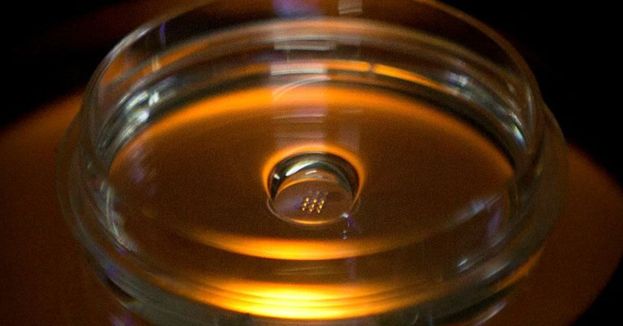The team, led by Chinese reproductive engineer Zhen Lu at the State Key Laboratory of Neuroscience in Shanghai, also generated synthetic embryos using monkey embryonic stem cells and initiated monkey pregnancies via a process resembling in vitro fertilization. The researchers created human embryo-like models by reprogramming embryonic stem cells. The synthetic embryo begins a developmental milestone known as gastrulation when the embryo transforms from being a continuous sheet of cells to forming distinct cell lines and setting up the primary axes of the body.
The model showed the presence of primordial cells, that are the precursor cells of egg and sperm. The researchers called the dehumanized process and its monstrous result "beautiful," adding that their human model is the first three-lineage human embryo model that specifies amnion and germ cells, precursor cells of egg and sperm.
MUST WATCH: GIANT EMPEROR TRUMP FIGURE AT ITALIAN FESTIVAL![]()
Janet Rossant, a developmental biologist and International Society for Stem Cell Research steering committee member told the MIT Technology Review that such synthetic embryos could survive to become viable humans if equipped with all the suitable cell types.
MUST WATCH: AUSTRALIAN BROADCASTER MOPS THE FLOOR WITH CLIMATE ACTIVISTS![]()
However, Magdalena Zernicka-Goetz, who led the research, stressed to CNN that "they are not human embryos. ... They are embryo models, but they are very exciting because they are very looking similar to human embryos and very important path towards discovery of why so many pregnancies fail, as the majority of the pregnancies fail around the time of the development at which we build these embryo-like structures."
YOU WON'T BELIEVE HOW MUCH RESIDENTS IN THESE STATES PAY IN LIFETIME TAXES![]()
June 16, 2023
While it is illegal to implant these embryos in a woman's womb, the novelty of the stem cell-derived embryos presently affords scientists leeway they would not otherwise have if dealing with embryos resultant of sperm-and-egg fertilization. Unlike human embryos arising from in vitro fertilization (IVF), where there is an established legal framework, there are currently no clear regulations governing stem cell-derived models of human embryos.
THE ISRAELI RAFAH INVASION PLAN HAS THE WHITE HOUSE IN A TIZZY![]()
There is an urgent need for regulations to provide a framework for creating and using stem cell-derived models of human embryos, said James Briscoe, associate research director at the Francis Crick Institute.
IVF-sourced embryos are presently subject to the ethics-informed "14-day rule." Professor Martin Pera with the Jackson Laboratory noted in the journal Development that the 14-day rule, whereby the in vitro culture of the human embryo is not allowed to proceed beyond day 14 of embryonic development in various jurisdictions, was the result of bioethical discussions that took place in the early days of the IVF field in the 1970s, especially after the first successful birth of a British child conceived by IVF.
THE TRAGIC TALE OF IGNORED WARNINGS: HOW 2023 MAINE MASS SHOOTING COULD HAVE BEEN PREVENTED![]()
While the prevailing wisdom appeared to be that it was ethically questionable to conduct experiments on human beings during their embryonic stage of development, according to Pera, the four key arguments advanced in support of a 14-day limit on embryo culture were as follows:
U.S. INTELLIGENCE AGENCIES' REPORT RELEASED: WHO WAS RESPONSIBLE FOR NAVALNY'S DEATH?![]()
While regulatory bodies at American universities and other research institutions in the U.S. allegedly adhere to the "14-day rule," the International Society for Stem Cell Research issued a recommendation in its 2021 guidance that the possibility of increasing the permitted culture time be considered by "national academies of science, academic societies, funders, and regulators." NPR reported that creating so-called embryoids, living entities made from human stem cells increasingly complex and comparable to human embryos has "added pressure to extend the rule so scientists could compare these new entities with naturally conceived embryos."
WAIT FOR GAS PRICES TO RISE! OVER 30 MISSILES LAUNCHED AT UKRAINE'S ENERGY INFRASTRUCTURE![]()
Dr. Ildem Akerman, from the University of Birmingham, told the BBC, "These findings suggest that we would soon develop the technology to grow these cells beyond the 14-day limit, with potentially more insights to gain into human development. ... Nevertheless, the ability to do something does not justify doing it." Robin Lovell-Badge, the head of stem cell biology and developmental genetics at the Francis Crick Institute, told the Guardian, "If the whole intention is that these models are very much like normal embryos, then in a way they should be treated the same. ... Currently in legislation they're not. People are worried about this."








 Discover alternative ideas that will make you think
Discover alternative ideas that will make you think Engage in mind bending debate
Engage in mind bending debate Earn points, rise in rank, have fun
Earn points, rise in rank, have fun


